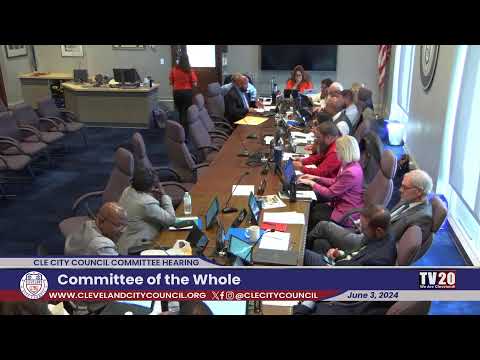Cleveland City Council passed a flurry of bills and resolutions at their regular meeting on June 3. Earlier that day, Documenter Stésià Swain live-tweeted the Committee of the Whole meeting. Here are a few of the actions council took.
Approved later: Rate increases for water and sewer services.
In May, Catherine Troy, chief financial officer for the Department of Public Utilities, told council that the increase would amount to less than $9 a year for the average customer.
Troy said that annual rate increases for the Division of Water would be necessary to maintain the division’s operations, its reserve funds, and its ability to pay off debts and cover capital expenses.
Water Pollution Control is “significantly behind” on replacing sewer pipes, which are supposed to last 100 years, Troy said. The division plans to ramp up capital spending for that work.
Approved later: A resolution changing the name of Moulton/Scoutway Park to Shirley Chisolm Park.
Chisolm was the first African American woman elected to Congress (in 1968) and the first woman and African American to run for president in a major political party (1972). She served in Congress until 1983. In 2015, she was posthumously awarded the Presidential Medal of Freedom.
Approved later: A resolution “Urging the Cleveland Metropolitan School District to change the name of East Professional Center to Arnold R. Pinkney
Professional Center.”
Pinkney is the chairman of Pinkney-Perry Insurance Agency and senior consultant and chief operations officer of Betpin & Associates, a consulting firm. The resolution calls him ”a great proponent of education” and notes his years of service on the Cleveland School Board in the 1960s and ’70s.
Approved later: The purchase of blast-resistant trash receptacles for Cleveland Hopkins International Airport.
“Trash bins pose a significant risk because they can easily conceal an explosive device placed by a terrorist in a public area,” according to the Department of Homeland Security.
In a memo explaining the request to purchase new trash cans, Cleveland’s Department of Port Control explains: “Their primary purpose is to diffuse the force of an explosion by directing a blast upwards, thereby protecting bystanders from the fragmentation that can result when an explosive device is detonated. There are currently 45 blast resistant trash receptacles at Cleveland Hopkins Airport, now approximately fifteen years old and showing signs of wear.”
The memo puts the cost of the contracts at $217,000.
The Cleveland City Council meeting agenda and minutes are available here. The live stream is available on YouTube:




